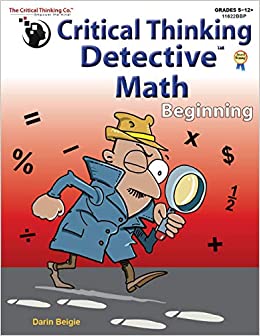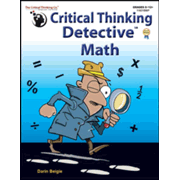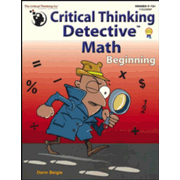The Critical Thinking Detective™ series includes three strands of books: math, critical thinking, and vocabulary. This review focuses on the math strand which consists of two books: Math - Beginning for grades five through twelve and Math (with no other subtitle) for grades six through twelve. The format is the same in both books.
As with the other Critical Thinking Detective books, each lesson is set up on one page, showing four possible culprits for a crime or misadventure. Students need to read a few paragraphs that include the statements of observers and some data points. The math series includes a substantial amount of numerical information—sometimes within the text, sometimes as bullet points, and sometimes in charts. Brief statements from each of the suspects provide further information for the student to consider.
Students have to piece together information from the various sources to eliminate either two or three innocent parties and identify the one or two that are guilty. Students are told to assume that everything they read in a lesson is a true statement.
The problems are complex and require both critical thinking and math skills. For instance, The Gold Smuggler, a lesson in Critical Thinking Detective: Math, has four people shipping different commodities, and two of them are guilty of each smuggling four pounds of gold in their shipments. Students are given data, such as the cost and weight per cubic foot of a commodity, the total cost of the shipment, the total weight of the shipment, the size and weight of three sizes of packing boxes, and a few other factors—but not the same information for all shipments. Most of the information is relevant, and students have to come up with their own process for sorting and applying it. The math itself isn’t too difficult, but students have to figure out which math processes to use. Students should work on scrap paper as they work through each lesson.
An activity page opposite each lesson page is used at the end for students to write out the evidence for their conclusions, including their mathematical reasoning.
If students get stuck, there are pages with hints that a parent or teacher can share. There are four to six hints for each lesson, and most hints apply only to particular suspects. Students should be given only one of these at a time, and more only if necessary. Once students figure out whether one suspect is innocent or guilty, they might have a good idea of how to work through the information for the others.
Each book has twelve lessons, so a student can easily complete both books in one year using one lesson per week. Books are available in print or as ebooks (printable books that are only readable on Windows systems). Answer keys with full explanations are at the back of each book.
Summary
The Critical Thinking Detective's math books are great for developing logic skills, especially in regard to applied math. While the scenarios in the book are more complex than most real-life situations, the mathematical applications mirror those that students might encounter. The puzzle-solving aspect of each lesson is likely to be highly motivational for students who might otherwise avoid complex math word problems.










